

REACHING183 COUNTRIESFORISRAE L 45YEARSIN JERUSALEM
The International Christian Embassy Jerusalem was established in1980 in recognition of the biblical significance of all of Jerusalem and its unique connection to the Jewish people. Today the ICEJ represents millions of Christians, churches, and denominations to the nation and people of Israel. We recognize in the restoration of Israel the faithfulness of God to keep His ancient covenant with the Jewish people. Our main objectives are:
• To stand with Israel in support and friendship
• To equip and teach the worldwide church regarding God’s purposes with Israel and the nations of the Middle East
• To be an active voice of reconciliation between Jews, Christians, and Arabs, and to support the churches and congregations in the Holy Land
From its head offices in Jerusalem, the ICEJ reaches out into more than 170 countries worldwide, with branch offices in over 90 nations.
Our vision is:
• To reach every segment of Israel’s society with a Christian testimony of comfort and love
• To reach and actively represent to Israel the support of denominations, churches, and believers from every nation on Earth
The Christian Embassy is a non-denominational faith-based ministry supported by the voluntary contributions of our partners and friends across the globe. We invite you to join with us as we minister to Israel and the Jewish people worldwide by donating to the ongoing work and witness of the ICEJ.
FROM THE DESK OF THE PRESIDENT
Dear Friends,

Though the dramatic air campaign against Iran has quieted, the region remains tenuous. In Gaza, there are 20 hostages still alive and 30 deceased, while the toll on Israeli soldiers continues to climb. Just across the border in Syria, the recent brutal massacre of an entire Druze family and hundreds of other Druze has pulled Israel’s gaze northward once again, prompting IDF “warning” strikes near Druze-majority towns and vows of “painful blows” should the bloodshed persist. In the West Bank, Israeli forces press on with raids in Jenin and Nablus to dismantle Hamas and Islamic Jihad networks, even as the fragile ceasefire with Hezbollah in Lebanon teeters under the weight of continued skirmishes. And the Israeli military is still striking Houthi-controlled strongholds. Israel’s fight is not just one battle but a broader battlefield with no clear end in sight.
Through it all, the ICEJ continues to stand firm in support of Israel and the Jewish people in love, comfort, and care. We have recently provided communication devices to communities in northern Israel, and we are working hard to place even more bomb shelters in vulnerable communities so that as many Israelis as possible have a safe place to run to if tensions escalate again. You can read about these initiatives in this month’s issue.
Despite Israel’s precarious situation, Aliyah has miraculously continued! This modern-day exodus isn’t merely a political phenomenon but a divine proclamation to an unbelieving world that the God of Abraham, Isaac, and Jacob still acts in human history, fulfilling ancient promises with astonishing precision. Our Aliyah Director, Howard Flower, provides a compelling article about the prophetic significance of Aliyah in our day. You’ll be encouraged to read about 40 Jewish immigrants from France who arrived on a special immigration flight that landed in Israel just hours after the recent 12-day war with Iran ended. I encourage you to read both.
We continue to meet daily for our Global Prayer Gatherings, which provide updates from Israel, prayer, and times of worship. Join us any day. Learn more at: www.icejusa.org/event-item-global-prayer-gathering.
CREDITS
ICEJ President Dr. Juergen Buehler
USA President Susan Michael
VP International Affairs Dr. Mojmir Kallus
VP Finance David van der Walt
USA Director of Finance Barry R. Denison
Senior VP & International Spokesman David Parsons
VP AID & Aliyah Nicole Yoder
Managing Editor/Publications Director Laurina Driesse
USA Managing Editor Karen Engle
Staff Writer Anastasiya Gooding
Graphic Design/Illustrators Ryan Tsuen, Nancy Schimp
Photography Adobe Stock, Adobe Firefly, Shutterstock, GPO AP, Flash90, Yossi Zeilger-JAFI, iStock, Suhyeon Chol-UnSplash, Operation Lifeshield,Wikimedia, Wordpress, ICEJ Staff, and Branches
The New King James Bible is used for all Bible references unless otherwise noted.
Word From Jerusalem is published by the International Christian Embassy Jerusalem. Reproduction in whole or in part without written permission is prohibited. Word From Jerusalem has no subscription price and is supported through contributions worldwide. The ICEJ USA Branch is a 501(c)(3) non-profit organization with offices in Tennessee, Florida, and Washington, DC. All gifts to this ministry are tax-deductible according to United States law.
Thank you for your faithful support. May the Lord bless you from Zion!

Dr. Juergen Buehler ICEJ President
COVER PHOTO: An illustration of the Lion of Judah roaring over the Islamic Regime of Iran (generated using AI)
FOR MAGAZINE ARCHIVES visit www.icejusa.org/wfj

International Christian Embassy Jerusalem
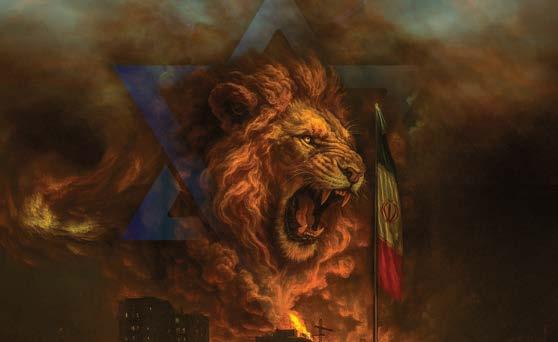





ISRAEL The Rising Lion
BY DR. JUERGEN BUEHLER, ICEJ PRESIDENT
As the high-stakes conflict between Israel and Iran unfolded this past June, there were two competing narratives on how we got here. As the fallout continues from Israel’s emerging victory in this historic confrontation, it remains imperative that world leaders decide which narrative holds the truth, because entertaining folly on an issue as weighty as nuclear arms can be enormously perilous for everyone.
On the night of June 13, Israel launched a sudden and powerful air campaign against the top leaders of the Iranian regime, its nuclear facilities, and its ballistic missile capabilities. The mullahs in Tehran considered Israel to be “a one-bomb country”—meaning it would take just one nuke to destroy the entire country. Repeatedly, Iranian leaders threatened to wipe Israel off the map, and thus, Iran has posed an existential threat to Israel’s national survival. Israel is a nation built on a mandate to be a haven for Jews everywhere and to ensure the Holocaust will never repeat itself.
Though Israel wound up its amazing operation against this threat, we should make no mistake: Iran’s ambitions did not stop with the dark vision of annihilating the Jewish State; it also aimed to take down the “Big Satan” of America, and with it, the whole Western world. As German Chancellor Friedrich Merz admitted at the recent G7 summit, Israel “is doing the dirty work for us” in finally confronting the global threat of Iran.
The 12-Day Israel and Iran War: “Operation Rising Lion” In his address to the nation after that initial wave of attacks, Israeli Prime Minister Benjamin Netanyahu named the military campaign “Operation Rising Lion.” The day before, he had hosted
Argentina’s new leader Javier Milei, a strong friend of Israel. As they went together to the Western Wall for prayer, Netanyahu seemed at peace with himself and placed a small note in Hebrew into the ancient stones of the Kotel. It contained a quote from the prophecy of Balaam over Israel found in the book of Numbers: “Look, a people rises like a lioness, and lifts itself up like a lion” (Numbers 23:24 NKJV). The message was clear: Israel, the Lion, has risen!
Less than two years ago, Israel did not seem like a rising lion. On October 7, 2023, Israel was blindsided by a massive terror attack exactly on the 50th anniversary of the Yom Kippur War, when it also had been caught completely by surprise by its enemies in October 1973. However, this October 7 was worse than back in 1973. In the years leading up to that fateful day two years ago, Israelis were repeatedly assured that the nation had the most secure hi-tech border fence in the world around Gaza, and that Hamas would never dare to attack the IDF. With some 1,200 casualties, mostly civilians, and 251 Israelis taken hostage, October 7 was what President Isaac Herzog described as the worst single day for the Jewish people since the Holocaust.
In many ways Israel is still traumatized by the barbaric crimes committed in the Gaza border area that day, yet it also is recovering from those wounds and striking back hard. It first hit Hamas in Gaza and then Hezbollah in Lebanon. What no one could foresee two years ago has taken place. Hamas has been dramatically weakened, and in a matter of weeks, Hezbollah lost its entire leadership and the vast majority of its 150,000 missiles and rockets aimed at Israel.
The Balaam Prophecies
The Balaam prophecies in Numbers refer to Israel in one other place as a lion: “He bows down, he lies down as a lion; and as a lion, who shall rouse him?” (Numbers 24:9 NKJV).
Indeed, Hamas awakened the Lion of Israel on October 7, and this nation has now torn its enemies and dramatically changed the Middle East for the better. Hamas is vastly weakened. Hezbollah now complies with the Lebanese government’s demand not to drag the nation into another war with Israel. The Assad regime in Syria, another ally of Iran that suppressed and slaughtered its own people and threatened Israel, has collapsed. And now Israel has at long last directly targeted Iran, the head of the octopus of terror. Indeed, Iran has been confronted and is losing much of its malicious influence in the Middle East and around the world. Surely, the Lion of Israel has risen!
The True Lion Who Fights for His People
The Bible often refers to Israel as a lion. In the patriarch Jacob’s prophetic words over Judah, he declares: “Judah is a lion’s whelp . . . he lies down as a lion; and as a lion, who shall rouse him?” (Genesis 49:9 NKJV). The two tribes Dan and Gad are blessed by Moses as resembling lions (Deuteronomy 33:20, 22). Some of David’s mighty men were warriors “whose faces were like the faces of lions” (1 Chronicles 12:8). Solomon’s throne and the artwork of his temple’s interior were full of lion depictions (1 Kings 7:29, 36; 10:19ff). These temple decorations full of lions are a reminder: God Himself is the true Lion fighting for His people!
Why Support Israel
Sometimes people ask me how we can support Israel as a nation full of faults. There is an interesting lesson in the Balaam prophecies previously cited. Under the guidance of the Holy Spirit, Balaam makes an astounding statement: “He has not observed iniquity in Jacob, nor has He seen wickedness in Israel. The Lord his God is with him, and the shout of a King is among them” (Numbers 23:21).
Just a quick glance through the preceding chapters reveals Israel was actually in a poor spiritual state. The people were complaining “against Moses and God” over why he brought them out of Egypt (Numbers 21:4–9). Even Moses lost his right to enter the land of promise by wrongly responding to another rebellion (Numbers 20). Repeatedly, Israel rebelled against God and His chosen leader. Some of the uprisings sprang even from within Moses’ inner circle of leaders, which would have been reason enough to judge and condemn Israel. But as Balaam went out to curse Israel, he instead had to proclaim: “He has not observed iniquity in Jacob, nor has He seen wickedness in Israel” (Numbers 23:21).
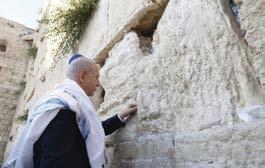
He Remains Faithful
In the early days of the war in Gaza, I visited the Jerusalem Zoo with my wife and daughter. During those days the battle in Gaza was particularly intense, and reports of hand-to-hand combat appeared in the news. My wife was sitting on a bench of the beautiful park praying for the soldiers in Gaza and reading reports of another pair of young Israeli soldiers killed in Gaza, when she heard an intense roar from the lions’ cage. We went up to the lion enclosure and saw the mighty male lion sitting on a perch with a lion’s cub crouched in front of its father. The cub was actually covered by his father’s huge mane.
That was a picture of what we are witnessing today. The little lion is seen rising and is spoken about in all the world media. What the political pundits do not understand, however, is that the big Lion is the one we hear roaring. Joel heard the Lord roaring from Zion as the nations gathered against Israel (Joel 3:16). In the book of Revelation, Yeshua Himself is called “the Lion of the tribe of Judah” (5:5). He roars and is active on behalf of His people Israel.
Man’s view is always different from God’s view, which was determined by the constant ministry and sacrifice in the tabernacle and by God’s eternal covenant promises and purposes for His people. This was true for Israel—but it’s also true for Christians today. Each one of us keeps sinning, keeps growing cold, keeps falling short according to God’s standards. There are many reasons for God to condemn and forsake us. But He looks upon us through the finished work of Christ on the cross. Paul says it so beautifully in 2 Timothy 2:13: “If we are faithless, He remains faithful; He cannot deny Himself.” This remains true also for Israel.
Therefore, let us look upon His people with God’s eyes. Yes, Israel surely is not perfect—but ask God to give you His heavenly view on Israel.
Israel’s Growing Impact
Finally, we are witnessing today a prophetic dynamic in the Middle East that has characterized Israel since its modern-day rebirth in 1948, and which can be found in many Hebrew prophets’ writings. Israel is increasingly growing into a regional, even global, force that must be reckoned with. During the early days of the recent attack on Iran, Israel’s foreign ministry informed on a WhatsApp channel that a certain Arab nation was collaborating with Israel, fearing it might be next in line.
There is an ever-increasing respect of Israel since the War of Independence in 1948. The Six-Day War and Yom Kippur War,
Netanyahu slips a prayer note into Western Wall stones.
(Photo: GPO)
both fought against multiple Arab nations, were both miraculous victories that stunned the Arab world. How much more respect will Israel have after confronting and thrashing the regional bully of Iran?
Israel’s recent victory over Hezbollah and its rapid trouncing of the Iranian terror regime, the operational excellence of Israel’s intelligence services, and the comparatively limited damage in Israel after absorbing hundreds of ballistic missile strikes is even considered by secular Israelis to be miraculous and the hand of Providence. In a recent live broadcast, a secular Israeli news anchor took out his book of Psalms, put a kippa on his head, and read a psalm of thanksgiving on air! He added that Israel is indeed “the land of signs and wonders.”
Isaiah
The prophet Isaiah describes Israel as the servant of God who has returned from the ends of the earth (Isaiah 43:8ff). Repeatedly, God encourages the tiny nation that He is the One who upholds them. Three times in chapter 41, God commands “Fear not!” (Isaiah 41:10, 13–14), saying that it is He who “upholds them with His right hand.” God gives them an unusual name, saying, “you worm Jacob.” Yet as the Redeemer of Israel, He boasts of His great purposes for this lowly people:
Behold, I will make you into a new threshing sledge with sharp teeth; you shall thresh the mountains and beat them small, and make the hills like chaff. You shall winnow them, the wind shall carry them away, and the whirlwind shall scatter them; you shall rejoice in the Lord, and glory in the Holy One of Israel. (Isaiah 41:15–16)
Invariably, I had to think of these passages as Israel swiftly dealt with 3,000 Hezbollah terrorists in one moment during the incredible “pager operation” last year, and now many of Iran’s top leaders have been dealt with in a similar way. It is miraculous indeed. In a real sense, all those who touched Israel in the last two years—Iran and all its terror proxies all the way up to the Mullahs in Tehran—burned their hands.
Zechariah
A similar dynamic is also described by the prophet Zechariah. He depicts an Israel who has returned to their Land and to Jerusalem. Israel finds itself in a time of great challenges and is surrounded by enemy armies who try to lay siege to the city. However, the outcome is glorious:
In that day I will make the governors of Judah like a firepan in the woodpile, and like a fiery torch in the sheaves . . . In that day the Lord will defend the inhabitants of Jerusalem; the one who is feeble among them in that day shall be like David, and the house of David shall be like God . . . in that day . . . I will seek to destroy all the nations that come against Jerusalem. (Zechariah 12:6–9 NKJV)

first-responder eyes an Iranian
that
Both Isaiah and Zechariah foresee a time in the last days when indeed the Lion will rise and bring judgement on the forces of evil around Israel.
Without a doubt, we are seeing a drastic paradigm shift taking place in our day that offers a great opportunity for change in the Middle East over coming decades. The populations of Lebanon and even Syria and Iran may have a chance for a better future. For Christians in the Middle East in particular, this could mean a new day of freedom. It also could mean that we soon might see the very first delegations of Christians from Lebanon, Iran, and other regional countries joining us at the Feast of Tabernacles in Jerusalem!
Could the Israel and Iran War Lead to Freedom?
A close relative of mine has family in Iran. In a recent call, she said her family was dancing on the roof in Tehran celebrating the possibility of freedom. Interestingly, the old flag of Iran had a lion holding a sword in its hand. Maybe Benjamin Netanyahu also thought about another lion rising when he named the military campaign against the Ayatollahs “Operation Rising Lion,” seeing the potential for the Iranian people rising into freedom too.
We may never know, but it all gives us ample reason to pray.
In this historic season, I encourage everyone to draw near to God in prayer and in His word. Pray for Israel, that this “little lion” will continue to be divinely protected, and that God will give its leaders wisdom and resolve over how to secure the peace. Pray that the roar of the Lion of the tribe of Judah, Yeshua the promised Messiah, will be heard more clearly than ever both in Israel and out among the nations.
Pray for the nations around Israel, particularly the churches in Lebanon, Syria, and Iran, for their special protection from above. Let us trust God that this current shaking in the region will lead to them recognizing that “the Lord is God!”
Also, please join our daily Global Prayer Gathering on Zoom as we are joined by hundreds of intercessors in prayer for Israel and the region. I look forward to seeing you there.
Israel experienced unprecedented devastation from more than 500 missiles fired from Iran in the 12-day war. Help provide practical assistance and comfort to a traumatized nation. GIVE TO: www.icejusa.org/israel-in-crisis
Israeli
missile
landed in Safed. (Photo: Flash90/David Cohen)


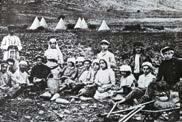



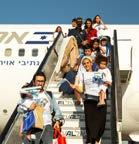
GOD’S WITNESS TO THE WORLD
BY HOWARD FLOWER, ICEJ ALIYAH DIRECTOR
Throughout history, God has used physical signs to make His invisible nature visible to humanity. Among these signs, perhaps none is more significant in our time than Aliyah—the miraculous return of the Jewish people to their ancestral homeland after millennia of exile. This modernday exodus isn’t merely a political phenomenon but a divine proclamation to an unbelieving world that the God of Abraham, Isaac, and Jacob still acts in human history, fulfilling ancient promises with astonishing precision.
A Promise Written in Time
When Moses stood before the Israelites at the edge of the promised land, he prophesied both blessing and exile, yet with an extraordinary promise of restoration: “If any of you are driven out to the farthest parts under heaven, from there the Lord your God will gather you, and from there He will bring you. Then the Lord your God will bring you to the land which your fathers possessed, and you shall possess it” (Deuteronomy 30:4–5). This wasn’t a prediction based on probability but a divine covenant that would transcend time.
For nearly two thousand years, this promise seemed impossible. The Jewish people were scattered across continents, facing persecution, pogroms, and ultimately the Holocaust. No other ancient people dispersed throughout the world had ever maintained their identity, let alone returned to reestablish their homeland. Yet against all historical precedent, we witness the Jewish people gathering “from the four corners of the earth” (Isaiah 11:12) to rebuild their ancient nation.
This fulfillment stands as a tangible sign to skeptics. In what other instance has a 3,000-year-old prophecy come to pass with such startling clarity? The mathematical improbability alone compels honest consideration that something—or Someone— beyond natural forces is at work.
God’s Character on Display
Through Aliyah, God displays not just His power but His character. When Ezekiel prophesied Israel’s regathering, God
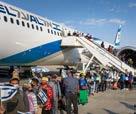

declared His motivation: “I do not do this for your sake, O house of Israel, but for My holy name’s sake, which you have profaned among the nations wherever you went” (Ezekiel 36:22). The return of Jewish people to their land isn't merely for their benefit but serves as God's witness to all nations.

This modern exodus reveals God’s unwavering commitment to His word. Unlike human promises that fade with changing circumstances or generations, God’s covenants stand firm across millennia. In a world filled with broken promises and institutional failures, Aliyah showcases divine faithfulness that transcends human weakness.
Furthermore, this regathering displays God’s compassion. Just as He heard Israel’s groaning in Egyptian bondage, He has responded to centuries of Jewish suffering: “I will gather those who sorrow over the appointed assembly . . . I will give you fame and praise among all the peoples of the earth, when I return your captives before your eyes” (Zephaniah 3:18–20).
The establishment of Israel after the Holocaust speaks to God’s mercy that follows judgment—not to diminish the horror of that genocide but to demonstrate that death never has the final word in His story.
When Human Weakness Meets Divine Strength
The story of Aliyah powerfully illustrates how God works through human weakness. Moses reminded Israel that their covenant with God required perfect obedience—an impossible standard for fallen humanity. Yet Deuteronomy 30:6 foreshadowed a solution: “The Lord your God will circumcise your heart . . . to love the Lord your God with all your heart and with all your soul.”
This spiritual transformation parallels what we see in Ezekiel 36:26–27: “I will give you a new heart and put a new spirit within you . . . I will put My Spirit within you and cause you to walk in My statutes.” God’s regathering of Israel was never intended to be merely geographic but spiritual—not just a return to the land but a return to Him.

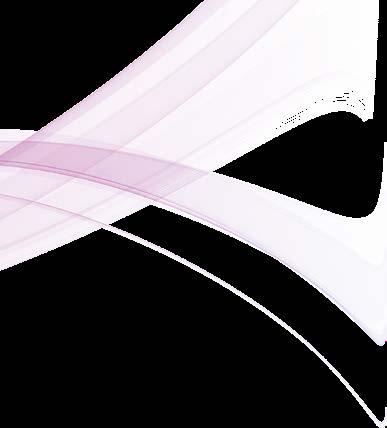

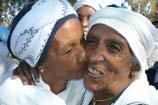

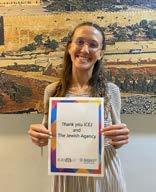

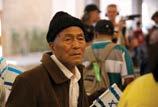
The miracle of Israel’s rebirth demonstrates how God accomplishes through grace what law could never achieve through human effort. Just as He provided manna, water, and protection during the first exodus, He has sustained modern Israel through seemingly impossible circumstances— surrounded by hostile nations, fighting multiple wars for survival, and transforming desert into fertile land.
The Nations as Witnesses and Participants Intriguingly, God’s plan for Aliyah intentionally involves Gentile nations as both witnesses and participants. Isaiah prophesied: “Thus says the Lord God: ‘Behold, I will lift My hand in an oath to the nations . . . they shall bring your sons in their arms, and your daughters shall be carried on their shoulders’” (49:22). This international involvement isn’t accidental but divinely orchestrated.
Throughout Israel’s modern restoration, we've seen this prophecy fulfilled as nations like the United States, Germany, Ethiopia, and Russia have played crucial roles in facilitating Jewish immigration. Operations Moses and Solomon brought Ethiopian Jews home through international cooperation. Following the Soviet Union's collapse, over one million Russian Jews returned to Israel.
These nations serve as unwitting actors in God’s cosmic drama, fulfilling His word while simultaneously being offered evidence of His reality. As Jeremiah foretold: “It shall be to Me a name of joy, a praise, and an honor before all nations of the earth, who shall hear all the good that I do to them; they shall fear and tremble for all the goodness and all the prosperity that I provide for it” (33:9).
Aliyah and Spiritual Awakening
The ultimate purpose of this divine sign isn’t merely to prove God's existence but to draw humanity into relationship with Him. The physical restoration of Israel foreshadows a spiritual restoration that will impact the entire world. Paul wrote that Israel’s “acceptance will be life from the dead” (Romans 11:15),



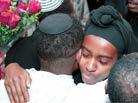
suggesting a connection between Jewish restoration and global spiritual awakening.
This pattern mirrors the Exodus, where God’s deliverance of Israel wasn’t the end but the beginning of His revelation. The plagues demonstrated His power over Egypt’s gods, and the parting of the Red Sea revealed His might, but these signs pointed toward Mount Sinai where God’s heart would be disclosed in covenant relationship.
Similarly, modern Aliyah testifies to God’s faithfulness, but it points toward a greater revelation where God will “will pour on the house of David and on the inhabitants of Jerusalem the Spirit of grace and supplication; then they will look on Me whom they pierced” (Zechariah 12:10). Their regathering prepares for their recognition of Messiah, which in turn will herald worldwide renewal.
Conclusion
In Aliyah, we witness not a coincidence of history but a divine signature across time. For the skeptic, it offers compelling evidence that the Bible contains knowledge no human could have foreseen. For the seeker, it reveals a God whose commitment to His word and compassion for humanity transcends our failures. And for believers, it confirms that the same God who split the Red Sea still acts today, gathering His people from exile not only to fulfill His ancient promises but proclaim His reality to a doubting world.
As nations watch this unfolding drama, they face the same decision as Pharaoh’s Egypt: to recognize the hand of God at work or to harden their hearts against the evidence before them. The promise of Ezekiel rings true today: “The nations shall know that I am the Lord when I am hallowed in you before their eyes” (Ezekiel 36:23). Through Aliyah, God continues to make Himself known, inviting all humanity to discover the faithful God behind this living sign.
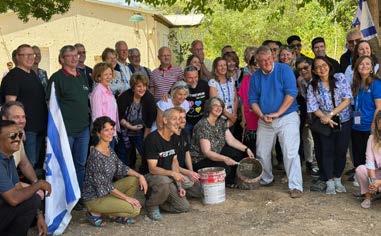

REBUILDING BE’ERI
A Story of Resilience after October 7
BY SHANNON BENNETT, ICEJ USA DIRECTOR OF COMMUNICATIONS
In April, during ICEJ’s International Leadership Conference, I had the humbling privilege of standing in Kibbutz Be’eri—witnessing firsthand the work of rebuilding Be’eri— alongside several of my colleagues from the USA Branch and our global ICEJ family. I had met some of the survivors from Be’eri last year when they visited the United States to share their heartbreaking stories. But visiting this spring—walking past burned homes and bullet-scarred kindergarten walls— allowed me to experience the story through their eyes in a way that changed me forever.
On October 7, 2023, Be’eri—once a lush, pioneering kibbutz founded before Israel’s rebirth as a nation—endured unspeakable brutality. More than one hundred residents were slaughtered and over thirty kidnapped. Mothers, fathers, and children were gunned down or burned alive in their own homes. One of the survivors I’ve gotten to know, Naor Pakciarz, described huddling for twenty hours with his wife and four children in a safe room, hearing gunfire and screams as hundreds of terrorists rampaged through the community. He watched the final messages of friends appear in Be’eri’s WhatsApp group and could do nothing to help. His father-inlaw was among those murdered.
A Community That Refuses to Give Up
Be’eri’s tragedy is a scar on Israel’s soul, yet it is also a testament to resilience. This was one of the first kibbutzim planted in the
1940s—a bold Zionist dream to make the desert bloom—and that spirit still runs deep. Within a week of the massacre, the community reopened Be’eri’s print shop, the nation’s primary producer of ID cards, licenses, and vital documents. Four hundred employees returned, and their courage sparked a ripple effect that reopened the dining hall and other kibbutz services and eventually inspired neighboring communities to begin to rise from the ashes.
Rebuilding Be’eri: Providing a Safe Haven for Its Children
Even with all this progress, Be’eri’s children still lack the safe space they once had. The youth activity center, seized and destroyed by Hamas, had been the heart of the kibbutz—a place of laughter and learning. In April, we helped lay the cornerstone for a new center. It will be a place of healing and a tangible sign of life after horror.
ICEJ is walking with Be’eri on this journey. Through our presence, prayers, and partnerships, we are standing shoulder to shoulder with these remarkable people. But we cannot do it alone.
Rebuilding the Be’eri Youth Center is more than bricks and mortar. It is a declaration that evil will not have the last word. I invite you to join us in this endeavor. Your gift will help restore a place where children can laugh again, learn again, and dream again.
Shannon Bennett, ICEJ USA Director of Communications at Kibbutz Be'eri
ICEJ national representatives visit Kibbutz Be'eri
REBUILDING KIBBUTZ BE’ERI
HELP REBUILD THE BE’ERI YOUTH CENTER IN ISRAEL
On October 7, 2023, Kibbutz Be’eri suffered one of the deadliest terror attacks in Israel’s history. Over 130 residents were killed or kidnapped— including 51 elderly—and more than 120 homes and 13 public buildings were destroyed. Among them was the youth activity center, once a safe and joyful space for elementary school children.
SUPPORT ISRAEL’S TRAUMATIZED FAMILIES
In April 2025, construction began on a new, secure youth center in Kibbutz Be’eri—designed as a vibrant space for learning, healing, and summer programs for returning families. More than a building, it will serve as a lifeline for a generation of traumatized Israeli children. Completion is expected by October 2026.
YOUR DONATION MATTERS


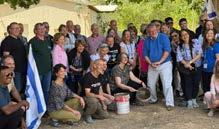
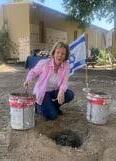
By giving to this urgent rebuilding effort, you are:
• Helping Israeli children heal from trauma
• Supporting a war-torn community through education and emotional recovery
• Fulfilling Isaiah 60:10: “Foreigners will rebuild your walls”
pour cement ... HELP US REBUILD!
Your gift declares to Israel: “You are not alone—American Christians are standing with you.”
Donate today at: www.icejusa.org/returnandrebuild

ICEJ National Representatives (top) and Susan Michael (left) help
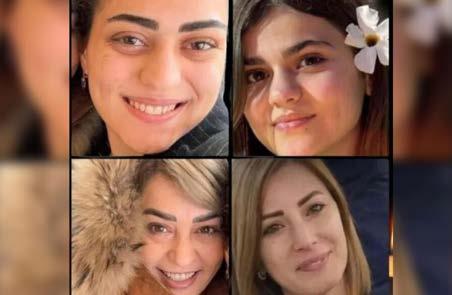
ICEJ HONORS HATIB FAMILY after Deadly Iran Missile Strike
BY NICOLE YODER, ICEJ VICE PRESIDENT OF AID AND ALIYAH
Following Israel’s preemptive strike on Iran’s accelerating nuclear program on June 13, 2025, 12 days of intense hostilities claimed the lives of over 28 Israelis before a fragile ceasefire brokered by President Trump took hold. Among the victims was 20-year-old law student Shada Hatib of Tamra, whose promising future was tragically cut short on June 15 when an Iranian missile strike leveled her home, killing her, her mother Manar, her 13-year-old sister Hala, and her aunt Manal.
Raja Hatib, Shada’s father and deputy chairman of the Haifa District Bar Association, survived the attack along with his daughter Razan. He described the loss as losing “the most beautiful flowers of my life.”
Shada was a passionate and driven young woman deeply committed to justice, community, and empowering Arab youth. She was actively involved in an ICEJ-sponsored program that opens doors for young Arab talents to Israel’s high-tech industry, providing training in programming, biotech, engineering, and essential skills like leadership and networking. Through this program, over 100 Arab university students each year gain vital experience and mentorship to prepare for careers in a field
where Arab representation is critically low.
Shada’s involvement in this program reflected her determination to build a future where young Arab citizens can thrive and contribute fully to Israeli society. She was excited to begin this journey and to impact those around her. Her loss is a heartbreaking reminder of how conflict can abruptly destroy lives full of promise.
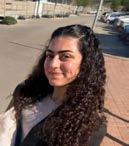
As her program director shared, “Shada’s potential was boundless, and her loss is a devastating one, for her family, her peers, and all who had the privilege of knowing her.”
ICEJ extends its deepest condolences to Shada’s loved ones. Our hearts are with them in this time of profound grief. May Shada’s memory be a blessing, and may her life and dedication continue to inspire the students this project touches.
Honor Shada’s life with a donation for other Arab Israelis to be mentored and contribute to Israeli Society. Give today: www.icejusa.org/aid
Shada Hatib

The International Christian Embassy Jerusalem (ICEJ) achieved a major milestone in our efforts to strengthen the emergency responders’ network in northern Israel, as the fifth communications relay system and antenna were successfully installed in the Upper Galilee. With this latest donation of radio devices to Israel, the entire Upper Galilee Regional Council can now communicate via secured lines, which has significantly enhanced the readiness of local emergency teams.
Vulnerable Northern Border Communities
While the rocket fire from Lebanon has abated due to the ceasefire with Hezbollah last November, the Iranianbacked terror militia remains a threat to Israel’s northern border communities. Hezbollah spent over a decade acquiring thousands of advanced missiles and drawing up plans to invade Israel, massacre civilians, and take scores of people hostage like Hamas did on October 7, 2023. Such a threat can never be ignored, so the ICEJ has been helping the northern towns and villages to be prepared with secured radio relay devices to improve communication among their first responder teams.
For years, this northern border region lacked sufficient communication gear for their emergency squads. The limited communication lines and mountainous
ICEJ PROVIDES COMMUNICATIONS DEVICES to More Communities in Northern Israel
BY NATIVIA SAMUELSON, ICEJ AID ADMINISTRATOR
terrain in the region posed serious challenges for civilian security teams, often blocking the transmission of urgent messages and distress calls during crises. The new ICEJ-donated relay system effectively eliminates these blind spots, ensuring clear, secure, uninterrupted communication in even the most remote locations.
Protection from Terror Threats
The Upper Galilee is now equipped with reliable communication devices and systems to help protect these frontline communities from terror threats in future. This is part of a nationwide project in which the ICEJ is distributing over 500 Motorola walkie-talkies and other smart handheld devices—plus base stations, antennas, and charging equipment—to first responders across Israel.
These communication devices serve a wide array of critical functions. They boost civilian emergency preparedness and are used by neighborhood patrols, youth movements, school bus drivers, and 24/7 emergency volunteer teams. They also act as essential backup systems in the event of a cyber or armed attack on other infrastructure. During such emergencies as wildfires or rocket attacks, emergency response teams and local volunteers often struggle to coordinate effectively to ensure the safety of residents and provide swift assistance in a crisis. These devices help bridge communication gaps
between local emergency responders, community leaders, and national security and emergency response teams, ensuring better cooperation and faster responses when it matters most.
Lives Saved on October 7
The urgency of real-time communication was never more evident than during the October 7 attack. Amnon Ziv, security chief for the Hof Ashkelon Regional Council, shared how the radio devices provided by the ICEJ helped spare many lives in southern Israel when Hamas invaded from Gaza.
“On October 7, I saw the Hamas terrorists break through the barrier, and I pressed one button that alerted all our security teams,” Ziv explained. “Within two minutes, our brave teams were at the fences of their communities defending their citizens and eliminating the terrorists. One button pushed saved the lives of 3,000 people that day.”
In a country where every second counts, especially during rocket attacks or infiltration attempts, these systems have already proven to be lifesavers. And behind every antenna and communication device is the support and dedication of Christian supporters around the world. The impact of this project will surely be felt for years to come, in faster response times and in the sense of safety it brings to families living under constant threat.
ICEJ SHELTERS PROTECT ISRAELIS AMID WAR WITH IRAN
BY NATIVIA SAMUELSON ICEJ AID ADMINISTRATOR
For 12 days in June, as Israel rose to the challenge of directly confronting Iran, communities across the nation came under fire yet again from deadly ballistic missiles. Iran launched nearly 550 missiles and 1,000 drones targeting Israeli cities and sensitive facilities. As Israelis weathered the storm, the International Christian Embassy Jerusalem (ICEJ) was comforted in knowing our supporters worldwide helped preserve lives through the hundreds of bomb shelters we have placed across the nation.
Over the past two decades, the ICEJ has donated 236 portable bomb shelters and renovated 175 existing underground shelters in vulnerable communities all around Israel. These efforts proved to be a life-saving investment amid this recent crisis.
Northern Israel
Yossi Turjeman, our contact in Ma'alot-Tarshiha—a mixed Jewish-Arab town near the Lebanese border that previously faced daily rocket attacks from Hezbollah in Lebanon—sent us photos from inside several bomb shelters. In late 2023, the ICEJ started renovating all 57 public bomb shelters in this town, which provided critical refuge during the recent Iranian missile attacks. Photos from inside one of those shelters showed civilian security officers, elderly residents, new immigrants from Ukraine and Russia, religious Jewish families from Nepal, and even a dog finding safety from the ongoing danger.
We have repeatedly heard from people across the country that these improved shelters not only provide physical safety but also much-needed peace of mind during attacks.
Haifa
The residents in our Home for Holocaust Survivors benefitted greatly from the large, secured room we built a few years ago right beside the main dining hall. The room was a welcome
refuge for our residents during the repeated missile barrages on Haifa, a key target of Iran due to its large port and oil refinery, among other strategic sites. In fact, Haifa has taken more direct missile impacts than any other city in Israel since the recent escalation began on June 13. Thankfully, our Survivors had a safe place to go!
Southern Israel
In southern Israel, our many shelters in the western Negev have proven their worth throughout the recent decades of rocket fire from nearby Gaza, and in the recent attack by Iran, these ICEJ-supplied shelters played a crucial role. On Kibbutz Dorot near the Gaza border, for example, residents slept in the large communal bomb shelter the ICEJ helped renovate. The updated facility includes sleeping areas, sanitation, and proper ventilation—which are essential when families must spend extended hours, even long nights, in these spaces.
More Shelters Needed
However, most missiles launched by Iran struck in crowded residential areas of Tel Aviv, Haifa, Bnei Brak, Rishon LeZion, Bat Yam, and other major cities. These strikes killed 28 people— mostly women, children, and the elderly—and left over 10,000 homeless. Meanwhile, the public demand for better, more accessible bomb shelters has surged.
While the Israeli government and Home Front Command work tirelessly to prepare the nation for these challenges, many shelters remain outdated, damaged, or completely unusable. This is why the Christian Embassy has worked closely with local municipalities and security officers to identify where shelters are most urgently needed.
Thanks to the support of Christian donors around the world, our hundreds of bomb shelters remain a tangible sign of Christian solidarity with Israel, not only for those born here but also for many who are new to the Land. All of them now share one thing in common: they have somewhere safe to run when the sirens sound.
In times of war, the value of a well-equipped shelter cannot be overstated. It can mean the difference between life and death. As the threats intensify, ICEJ remains committed to ensuring that as many Israelis as possible have a safe place to run to.

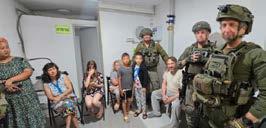
ICEJ renovated bomb shelter at the Home for Holocaust Survivors in Haifa
ICEJ renovated bomb shelter in Ma'alot-Tarshiha, a mixed Jewish-Arab town near the Lebanese border

In a small hospital room in Jerusalem, a young Israeli mother cradles her newborn son. Her eyes are tired, and her body is weak, but her heart is full. Just a few months earlier, she had been alone, afraid, and moments away from choosing abortion. Today, she is a hopeful woman who chose life in the face of despair.
Across Israel, stories like this are unfolding—quiet, courageous stories of women who find themselves at impossible crossroads. Some are teenagers. Others are single mothers, survivors of abuse, trauma, or addiction. Many are abandoned by partners, shunned by family, or struggling in poverty. And yet, amid their crisis, they are choosing to say “yes” to life.
By funding pro-life counselors, providing baby supplies, and ensuring aid for these women for the first year after birth, the ICEJ is helping these mothers turn fear into faith and uncertainty into love.
Here are some of their stories.
Rachel
At just 26, Rachel was facing a future she never imagined— pregnant, abandoned, and completely alone. The baby’s father was pressuring her to end the pregnancy. Her family offered no support. Fear closed in, paralyzing and relentless. But then, someone offered practical help—and everything changed. In that moment, Rachel paused, took a breath, and chose life.
Then, just a month before her due date, she was evicted from her apartment. With nowhere else to go, she moved in temporarily with the baby’s father—an unexpected shift that began to heal their broken relationship. Now she walks her baby through the neighborhood in a stroller, singing lullabies as she goes, grateful to be a mother.
Dana
In another corner of Jerusalem, Dana was juggling far more than most. At 39, she was caring for her disabled husband, plus children with special needs, while also managing a spinal injury. The news of an unplanned pregnancy was overwhelming. She
HELPING ISRAELI MOTHERS SAY “YES” TO LIFE
BY NATIVIA SAMUELSON ICEJ AID ADMINISTRATOR
did not see a way forward. But with practical help and emotional support from an ICEJ sponsorship—including baby supplies and someone to talk to—she slowly began to feel less trapped. She chose to continue the pregnancy, and when her son was born, she was a different woman. She still carried fear but was now steadied by resolve and a deepened sense of purpose. Dana named her baby boy Lior, which means, “My Light.”
Liat
Support made the difference for Liat too. Estranged from her ultra-Orthodox family, she faced a high-risk pregnancy completely alone. With no partner and no other plan, abortion felt like her only option. But after reaching out to local ICEJsupported pro-life counselors, her life-story changed. Consistent help and loving care made all the difference. When she was hospitalized at 31 weeks, Liat finally called her sister. Two days later, her son was born, and her parents, once distant, came to meet their grandson. It was a vital step toward a new beginning.
Esther
Esther was just 18 years old and 17 weeks pregnant when her boyfriend disappeared. Upon hearing about the pregnancy, her parents were furious and threatened to kick her out. Terrified and isolated, Esther saw abortion as the only way to keep things from completely falling apart. But with consistent encouragement from pro-life counselors, she held on. The support did not change her situation overnight, but it helped her find the strength to face it. In time, her parents came around. Her mother stood beside her in the delivery room when baby Yonatan was born.
Each of these women stood at a crossroads, overwhelmed by fear or isolation, and found the stability to choose a different way forward. And with someone walking alongside them, what once felt impossible became manageable.
We may not be able to undo the pain, poverty, or fear these women face, but we can respond with care, consistency, and compassion. Light has the power to push back the darkness, and sometimes, even the smallest glimmer is enough to change the course of a life.
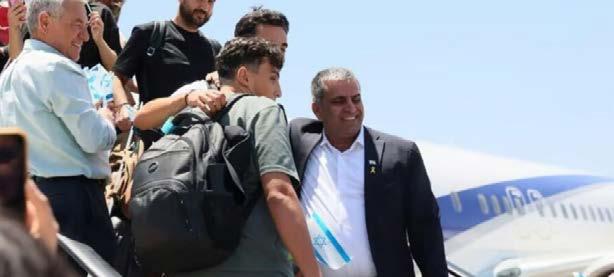
IAS ISRAEL’S WAR WITH IRAN ENDS ICEJ Brings French Jews Home to Israel on Special Aliyah Flight
BY MARELINKE VAN DER RIET, ICEJ PUBLICATIONS ASSISTANT
n a recent dramatic development, the International Christian Embassy Jerusalem (ICEJ) sponsored 40 Jewish immigrants (olim in Hebrew) from France on a special Aliyah (immigration) flight, which landed in Israel just hours after the 12-day war with Iran ended. Organized in partnership with The Jewish Agency for Israel (JAFI) and El Al Airlines, this was the first dedicated Aliyah rescue flight since the outbreak of war in Israel and stands as a powerful testament to the enduring connection between the Jewish people and the Land of Israel— even in times of crisis.
War with Iran Halts Flights
The short but intense war between Israel and Iran erupted on June 13, 2025, when Israel launched “Operation Rising Lion, a sweeping campaign of pre-emptive Israeli Air Force (IAF) airstrikes and Mossad missions that successfully targeted Iran’s nuclear and ballistic missile infrastructure. In response, Iran unleashed a barrage of over 550 missiles and 1,000 drones at Israeli cities and strategic sites, resulting in the deaths of 28 Israelis and extensive damage.
On June 22 the United States entered the conflict with “Operation Midnight Hammer,” deploying B2 stealth bombers to strike key underground Iranian nuclear facilities with heavy bunker-buster bombs. A ceasefire was brokered two days later on June 24 by US President Donald Trump, bringing an uneasy pause to the most direct and intense confrontation between the two nations to date.
During the war, Israel had imposed a total embargo on all flights in and out of the country and even moved the entire fleet of El Al planes abroad.
Jews Come Home to Israel
With the ceasefire in place, the country opened Israeli airspace,
albeit cautiously. Within days, a special flight with nearly 110 Jewish immigrants took off from Paris and landed safely at Ben Gurion Airport. Most of the newcomers came from France, but others arrived from the United Kingdom, Spain, the Netherlands, and Australia. Many of them had been waiting for weeks for this opportunity to finally come home, and the ICEJ was privileged to sponsor 40 of these new arrivals on their journey to Israel.
Though Israel remains on alert and life is only gradually returning to normal, Aliyah has not stopped. Against all odds, the Jewish people continue returning to their homeland. Remarkably, since October 7, 2023, over 45,000 new olim have arrived from around the world.
Shay Felber, JAFI Deputy Director-General for Aliyah and Absorption, confirmed there have been “zero cancelations” from prospective immigrants, despite the just-concluded war with Iran.
European Jews Flee Antisemitism Surge
The flight group from Paris included many European Jews fleeing a sharp rise in antisemitism across the continent. For these families, Aliyah was not just a relocation—it was an act of survival, identity, and divine destiny.
“We didn’t want our children growing up in fear,” said David Cohen, a new immigrant from Paris. “In Israel, they can be proud of their Jewishness without looking over their shoulders.”
This flight to bring French Jews home to Israel was far more than a rescue mission—it was a fulfillment of prophecy. Even as rockets fall and wars rage, the Jewish people continue to return to Zion, proving yet again that no force on earth can sever their ancient bond to the land. The journey home is not over. Help us bring more Jews home by giving toward our global Aliyah efforts today at: www.icejusa.org/aliyah
TALBOTT BAPTIST CHURCH "Blessed for Blessing Israel"

BY DR. TYSON LAMBERTSON ICEJ USA OUTREACH DIRECTOR LINDA W. SMITH, PhD
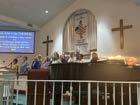
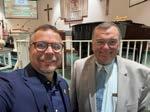
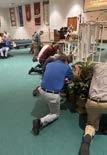
Arecent visit to Talbott Baptist Church to share about Israel has borne incredible fruit. Their response was generous and heartfelt, and the impact continues to grow.
This year, their Vacation Bible School (VBS) has experienced one of their largest turnouts in many years—around 40 children, 20 to 25 dedicated volunteers, and a vibrant adult Bible study class focused on learning about Israel averaging 10 participants each night.
One couple, who previously only attended Sunday mornings, began coming regularly after participating in the Wednesday night classes on Israel. Now, they haven’t missed a night of VBS. They’ve shared how much they love Israel, and it’s clear their hearts have been stirred.
Even more, one man told the pastor he’s been saved but never baptized—and is now considering taking that next step of faith. “You told me the church would be blessed for supporting Israel— and you were right,” the pastor said. “We see it happening now.”
We’re grateful for Talbott Baptist Church’s partnership and continue to pray for Talbott and their VBS outreach. God is truly at work!
Dr. Li nda W. Smith is the executive vice president of the ICEJ USA, assuming the position in May 2025. Previously she served as executive vice president for National Religious Broadcasters (NRB); president of the D. James Kennedy Center for Christian Statesmanship; chief of the office of public affairs for the Federal Bureau of Prisons; and chief of staff for the US Parole Commission.
Linda’s love for Israel began at a young age, growing up in a pro-Israel church and blessed by a mother who was a strong supporter of the Jewish people and the nation of Israel.
Her involvement with the ICEJ began when she met Dr. Susan Michael. Recognizing Linda’s strong support for Israel, Susan asked Linda to be part of the original Steering Committee for American Christian Leaders for Israel. Supporting Israel and the Jewish people have long been a passion for Linda. When Susan asked her to join the ICEJ USA team, she knew that was God’s next step for her life. She is humbled to be working with the ICEJ USA to help fulfill its important mission and is honored to be part of the tremendous ICEJ USA team.
Her faith guides every aspect of her professional life, realizing that all work is in service to the Lord and must be accomplished with excellence and informed by a biblical worldview.
Linda received a Doctor of Philosophy from the John Wesley School of Leadership at Carolina University. She received a doctorate in Public Administration from the University of Southern California. She holds a master’s degree in public administration from the same school and a second master’s degree and a Bachelor of Arts from West Virginia University. She is a member of the steering committee for American Christian Leaders for Israel (ACLI) and a member of the advisory board for the D. James Kennedy Center for Christian Statesmanship.
ICEJ USA Outreach Director Dr. Tyson Lambertson with Pastor Wade McCullough, Talbott Baptist Church, Talbott, TN

Your Israel Answer
Who Are the Druze? And Why Israel Should Support These “Guardians of the Mountains”
By Guest Writer Arthur A. Flower, son of ICEJ Aliyah Director Howard Flower
In the rugged mountains of the Levant, a secretive and resilient people have carved out a unique identity over centuries. The Druze, a religious and ethnic minority with roots in 11thcentury Egypt, have long been both persecuted and pragmatic, surviving by aligning with regional powers while guarding their faith’s mysteries. Today, their alliance with Israel—forged in shared struggle and mutual respect— stands as a testament to the complexities of Middle Eastern geopolitics and the moral imperatives that sometimes transcend it.
To understand the Druze-Israel bond, one must first delve into their history. As Dr. Mordechai Kedar, a renowned scholar of Arabic and Middle Eastern studies at Israel’s Bar-Ilan University, explained in a recent interview with Sarah Stern of the Endowment for Middle East Truth (EMET), the Druze emerged as a splinter group from Islam in the tenth century. Rejecting core Islamic tenets, they faced immediate persecution. “Once a person converts to Islam, there is no way out,” Kedar notes, referencing the severe punishment for apostasy in traditional Islamic law. The Druze, deemed heretics, fled to the mountainous regions of modern-day Lebanon, Syria, and Israel—a strategic choice. “Minorities always live in the mountains,” Kedar observes. “The Sunni Muslims live in the plains . but the mountains provide protection.”
Loyalty Ensures Survival
The Druze’s survival strategy has hinged on loyalty to the ruling power. Under the Ottoman Empire, they enjoyed autonomy by paying taxes and avoiding
conflict. But when the French and British dismantled Ottoman rule after World War I, the Druze rebelled against French attempts to integrate them into a Sunnidominated Syria. Their 1925 uprising, led by Sultan al-Atrash, became a symbol of resistance, though it ultimately failed. “The French put a siege on [their mountain] . almost killing them all by starvation,” Kedar recounts. Forced into the Syrian state, the Druze adopted a pragmatic approach: align with the strongest faction to ensure survival.
This pragmatism extended to Israel. During the 1948 War of Independence, Druze leaders, observing Israel’s resilience, chose to side with the nascent Jewish State. “They joined us wholeheartedly,” Kedar says. By 1955, Druze men were conscripted into the Israel Defense Forces (IDF), where they serve with distinction. Their combat unit volunteer rates exceed those of Jewish Israelis—a reflection of their commitment. “They know what they are defending,” Kedar emphasizes, recounting a story of a Druze officer whose father overheard Arab neighbors plotting to seize Druze homes after a hypothetical Arab victory in 1967. “You go and serve in the army because otherwise [they] will divide our houses,” the father urged.
Druze Communities in Israel
The Druze-Israel relationship is not merely transactional; it is familial. Druze communities in Israel’s Carmel region, Galilee, and Golan Heights are fully integrated, with many holding Israeli citizenship. Kedar highlights the heroism of figures like Salim Shufi, a Druze teenager who fled Syria to Israel
in the 1950s and later guided elite IDF units on covert missions. “Netanyahu and [other commanders] walked behind him into Syria and back,” Kedar says. Shufi’s legacy is honored annually, symbolizing the deep trust between the Druze and Israel.
Yet the Druze’s Syrian brethren face existential threats. Since Syria’s civil war, jihadist groups like Hay’at Tahrir al-Sham (HTS)—a faction with ties to Al-Qaeda—have targeted Druze villages, viewing them as apostates. Recently, Syrian government forces carried out a massacre of the Druze minority in Sweida in southern Syria, reportedly killing more than 350 people, including an entire family of 20. “They are butchering them, kidnapping their daughters,” Kedar warns. For Israel, the crisis is personal. Many Israeli Druze have relatives in Syria, and WhatsApp groups relay real-time pleas for help. “They demand the government protect their brothers,” Kedar notes.
Israel’s Moral Obligation
Israel’s intervention in Syria to protect the Druze is framed by both moral obligation and strategic calculus. Kedar argues that loyalty is a cornerstone of Middle Eastern culture: “If you betray your allies, you are not a human being.” Israel’s abandonment of the South Lebanon Army in 2000, he contends, stained its reputation. Supporting the Druze rectifies this—and sends a message to regional allies like Saudi Arabia and Egypt: Israel stands by its friends.
Moreover, the Druze are a bulwark against jihadist expansion. Kedar

proposes “credible threats” to HTS leader Abu Mohammad al-Julani: harm the Druze and face Israeli retaliation. Such deterrence, he argues, is low-cost compared to Israel’s broader multifront war against Iran’s proxies. “Protecting the Druze seems easy compared to Gaza or Yemen,” Kedar remarks.
The Druze dilemma also tests Israel’s identity as a nation that defends minorities. Kedar contrasts Israel’s treatment of the Druze with Assad’s oppression of Sunnis, noting that the Druze sided with Assad out of survival, not malice. “They had no choice but to be with the winner,” he says. Now, as the Druze face genocide, Israel’s actions will reverberate beyond Syria. “The whole Middle East is watching,” Kedar warns.
Conclusion
In a region where alliances shift like desert sands, the Druze-Israel bond endures. It is a partnership forged in mutual respect, shared sacrifice, and the unspoken rule of the Levant: loyalty is survival. As Kedar concludes, “We should support the Druze in every possible way.”
For Israel, the choice is clear—and so are the stakes.


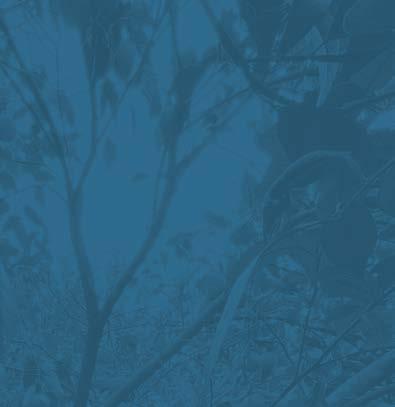
Coming Soon from Embassy

“A treasure for anyone seeking to deepen their study of the Bible.”
—Dr. Susan Michael, ICEJ President
In this soon-to-be released devotional, you’ll journey into the Hebrew roots of Scripture. Exploring Hiddeא Pearls uncovers the profound meaning behind the Bible’s figures, places, feasts, names of God, covenants, letters, and numbers—revealing the richness and depth often overlooked in traditional study.
More than just knowledge, this book offers perspective. By examining God’s covenant people, Israel, you’ll gain a clearer understanding of his unfolding plan for the world—and what it means for you today.



In Person or Online packages available
This year's Feast of Tabernacles is especially significant for Israel as it emerges from the prolonged conflict in this region. Thus, the ICEJ is reducing the entry price for our Feast 2025 to an all-time low—starting from $120 USD. We want to bring together as many Christians as possible for a solidarity and victory tour Sukkot, to support the nation as it recovers. Israel needs our friendship and presence now more than ever.
Online Packages
starting from $50 USD
● Full online access to the 5-day Feast gathering
● Videos on demand, accessible until the end of January 2026
● Digital certificate of participation

*
In-Person Conference Packages*
starting from $120 USD
● Registration to 4-day Jerusalem gathering or 5-day Desert-Jerusalem gathering
● Videos on demand, accessible until end of January 2026
In-Person Feast Tour Package starting from $1,629 USD
• Registration to all Feast events
• Hotel and transportation
• Touring as per itinerary (Subject to changes.)
• Videos on demand, accessible until end of January 2026
Zechariah 8:23
